Analyzing Public Health Crisis: Leadership and Systems Thinking
VerifiedAdded on 2023/03/31
|6
|1093
|435
Case Study
AI Summary
This case study examines Merck's Rofecoxib recall in 2004 and the FDA's role, highlighting the critical need for effective leadership and a systems-thinking approach in public health administration. The analysis focuses on the lack of visionary, creative, and analytical approaches by leaders at Merck and the FDA, as well as resistance to change and a lack of coordination between the organizations. It suggests that adopting pragmatist and idealist leadership styles, characterized by visionary thinking, critical self-review, and collaborative systems-oriented coordination, could have prevented the crisis. The case study concludes that a collaborative, systems-thinking approach, combined with proactive and critical leadership, is essential for ensuring public health and safety and preventing future crises. Desklib provides access to this solved assignment and other resources for students.
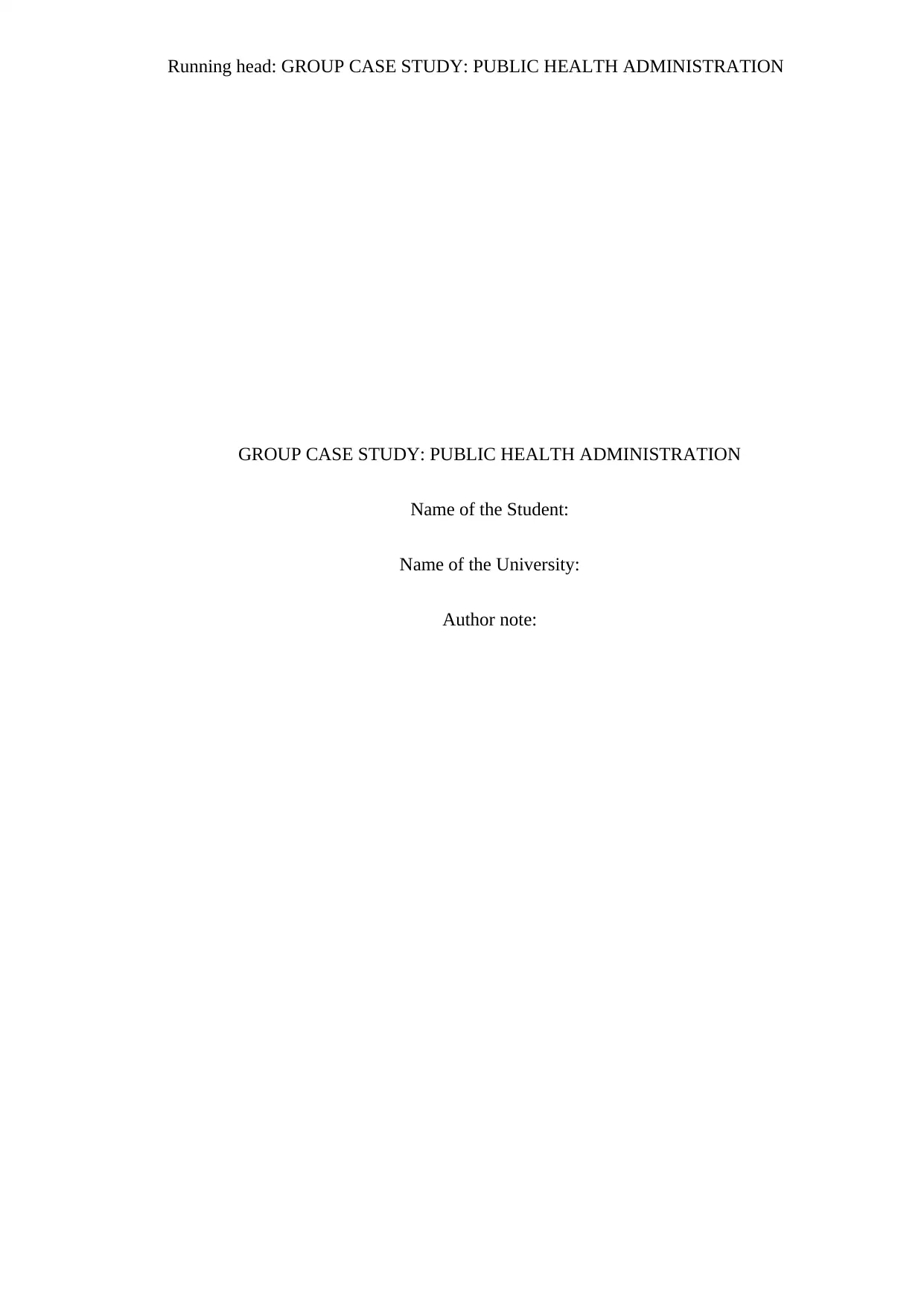
Running head: GROUP CASE STUDY: PUBLIC HEALTH ADMINISTRATION
GROUP CASE STUDY: PUBLIC HEALTH ADMINISTRATION
Name of the Student:
Name of the University:
Author note:
GROUP CASE STUDY: PUBLIC HEALTH ADMINISTRATION
Name of the Student:
Name of the University:
Author note:
Paraphrase This Document
Need a fresh take? Get an instant paraphrase of this document with our AI Paraphraser
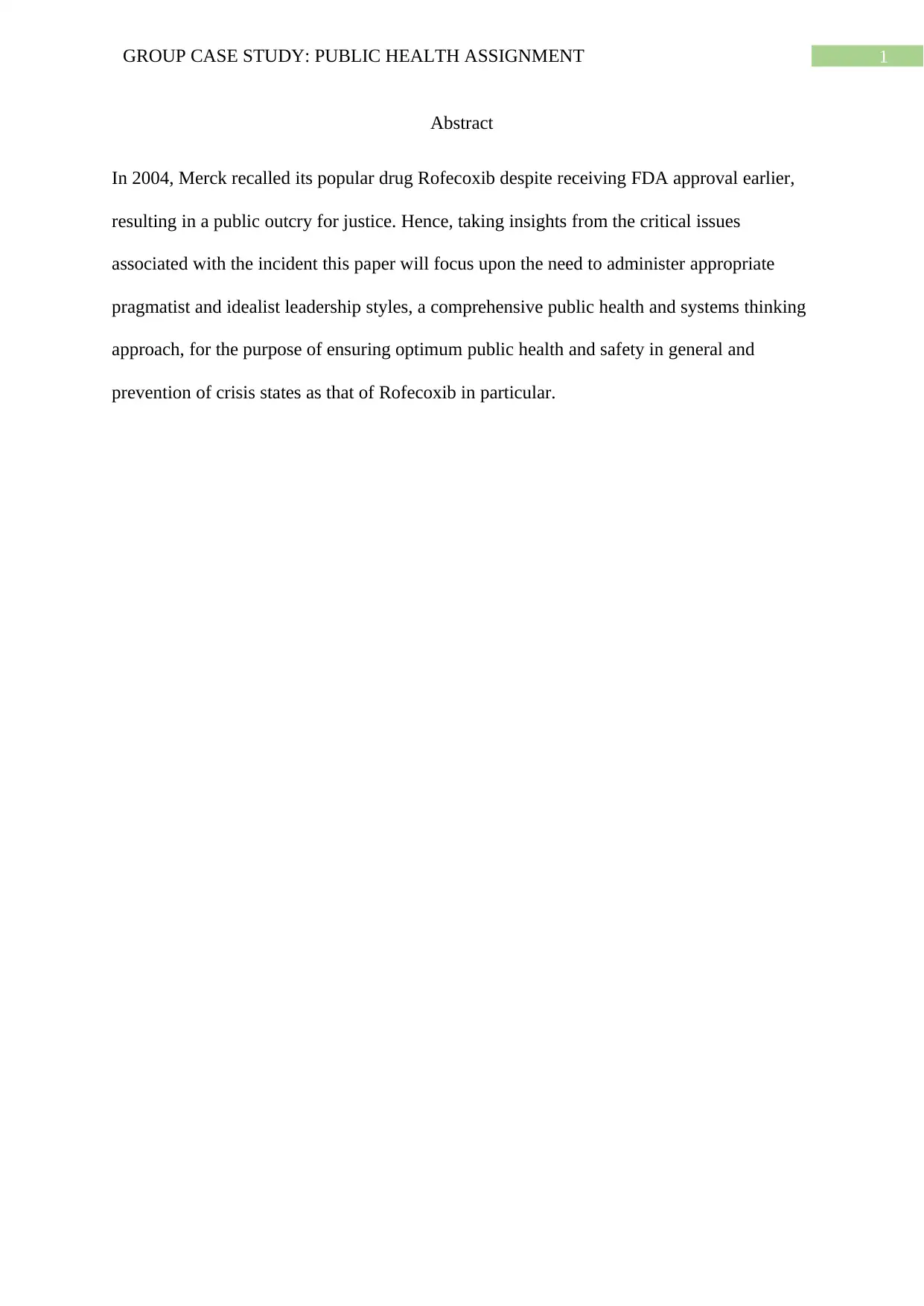
1GROUP CASE STUDY: PUBLIC HEALTH ASSIGNMENT
Abstract
In 2004, Merck recalled its popular drug Rofecoxib despite receiving FDA approval earlier,
resulting in a public outcry for justice. Hence, taking insights from the critical issues
associated with the incident this paper will focus upon the need to administer appropriate
pragmatist and idealist leadership styles, a comprehensive public health and systems thinking
approach, for the purpose of ensuring optimum public health and safety in general and
prevention of crisis states as that of Rofecoxib in particular.
Abstract
In 2004, Merck recalled its popular drug Rofecoxib despite receiving FDA approval earlier,
resulting in a public outcry for justice. Hence, taking insights from the critical issues
associated with the incident this paper will focus upon the need to administer appropriate
pragmatist and idealist leadership styles, a comprehensive public health and systems thinking
approach, for the purpose of ensuring optimum public health and safety in general and
prevention of crisis states as that of Rofecoxib in particular.
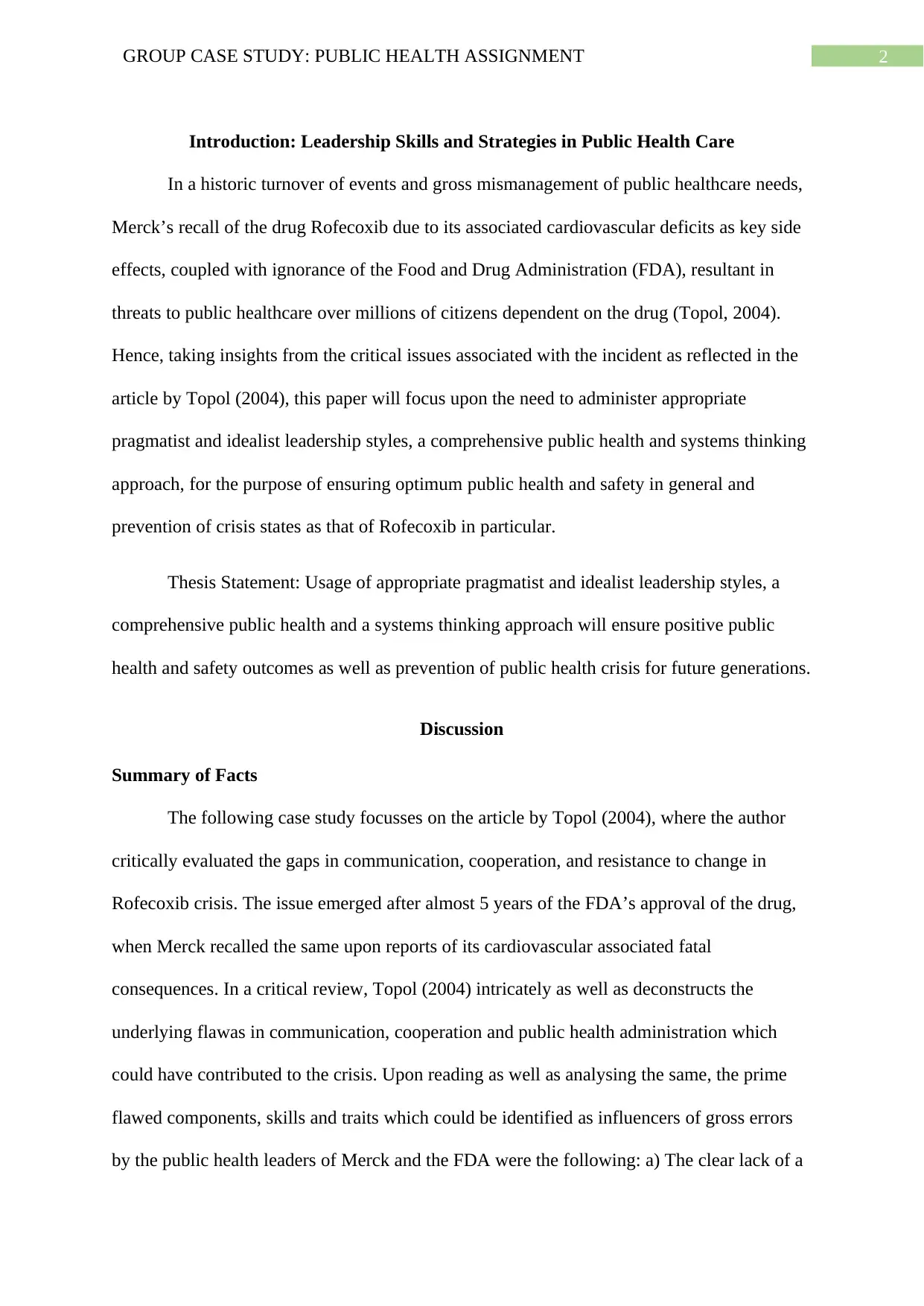
2GROUP CASE STUDY: PUBLIC HEALTH ASSIGNMENT
Introduction: Leadership Skills and Strategies in Public Health Care
In a historic turnover of events and gross mismanagement of public healthcare needs,
Merck’s recall of the drug Rofecoxib due to its associated cardiovascular deficits as key side
effects, coupled with ignorance of the Food and Drug Administration (FDA), resultant in
threats to public healthcare over millions of citizens dependent on the drug (Topol, 2004).
Hence, taking insights from the critical issues associated with the incident as reflected in the
article by Topol (2004), this paper will focus upon the need to administer appropriate
pragmatist and idealist leadership styles, a comprehensive public health and systems thinking
approach, for the purpose of ensuring optimum public health and safety in general and
prevention of crisis states as that of Rofecoxib in particular.
Thesis Statement: Usage of appropriate pragmatist and idealist leadership styles, a
comprehensive public health and a systems thinking approach will ensure positive public
health and safety outcomes as well as prevention of public health crisis for future generations.
Discussion
Summary of Facts
The following case study focusses on the article by Topol (2004), where the author
critically evaluated the gaps in communication, cooperation, and resistance to change in
Rofecoxib crisis. The issue emerged after almost 5 years of the FDA’s approval of the drug,
when Merck recalled the same upon reports of its cardiovascular associated fatal
consequences. In a critical review, Topol (2004) intricately as well as deconstructs the
underlying flawas in communication, cooperation and public health administration which
could have contributed to the crisis. Upon reading as well as analysing the same, the prime
flawed components, skills and traits which could be identified as influencers of gross errors
by the public health leaders of Merck and the FDA were the following: a) The clear lack of a
Introduction: Leadership Skills and Strategies in Public Health Care
In a historic turnover of events and gross mismanagement of public healthcare needs,
Merck’s recall of the drug Rofecoxib due to its associated cardiovascular deficits as key side
effects, coupled with ignorance of the Food and Drug Administration (FDA), resultant in
threats to public healthcare over millions of citizens dependent on the drug (Topol, 2004).
Hence, taking insights from the critical issues associated with the incident as reflected in the
article by Topol (2004), this paper will focus upon the need to administer appropriate
pragmatist and idealist leadership styles, a comprehensive public health and systems thinking
approach, for the purpose of ensuring optimum public health and safety in general and
prevention of crisis states as that of Rofecoxib in particular.
Thesis Statement: Usage of appropriate pragmatist and idealist leadership styles, a
comprehensive public health and a systems thinking approach will ensure positive public
health and safety outcomes as well as prevention of public health crisis for future generations.
Discussion
Summary of Facts
The following case study focusses on the article by Topol (2004), where the author
critically evaluated the gaps in communication, cooperation, and resistance to change in
Rofecoxib crisis. The issue emerged after almost 5 years of the FDA’s approval of the drug,
when Merck recalled the same upon reports of its cardiovascular associated fatal
consequences. In a critical review, Topol (2004) intricately as well as deconstructs the
underlying flawas in communication, cooperation and public health administration which
could have contributed to the crisis. Upon reading as well as analysing the same, the prime
flawed components, skills and traits which could be identified as influencers of gross errors
by the public health leaders of Merck and the FDA were the following: a) The clear lack of a
⊘ This is a preview!⊘
Do you want full access?
Subscribe today to unlock all pages.

Trusted by 1+ million students worldwide
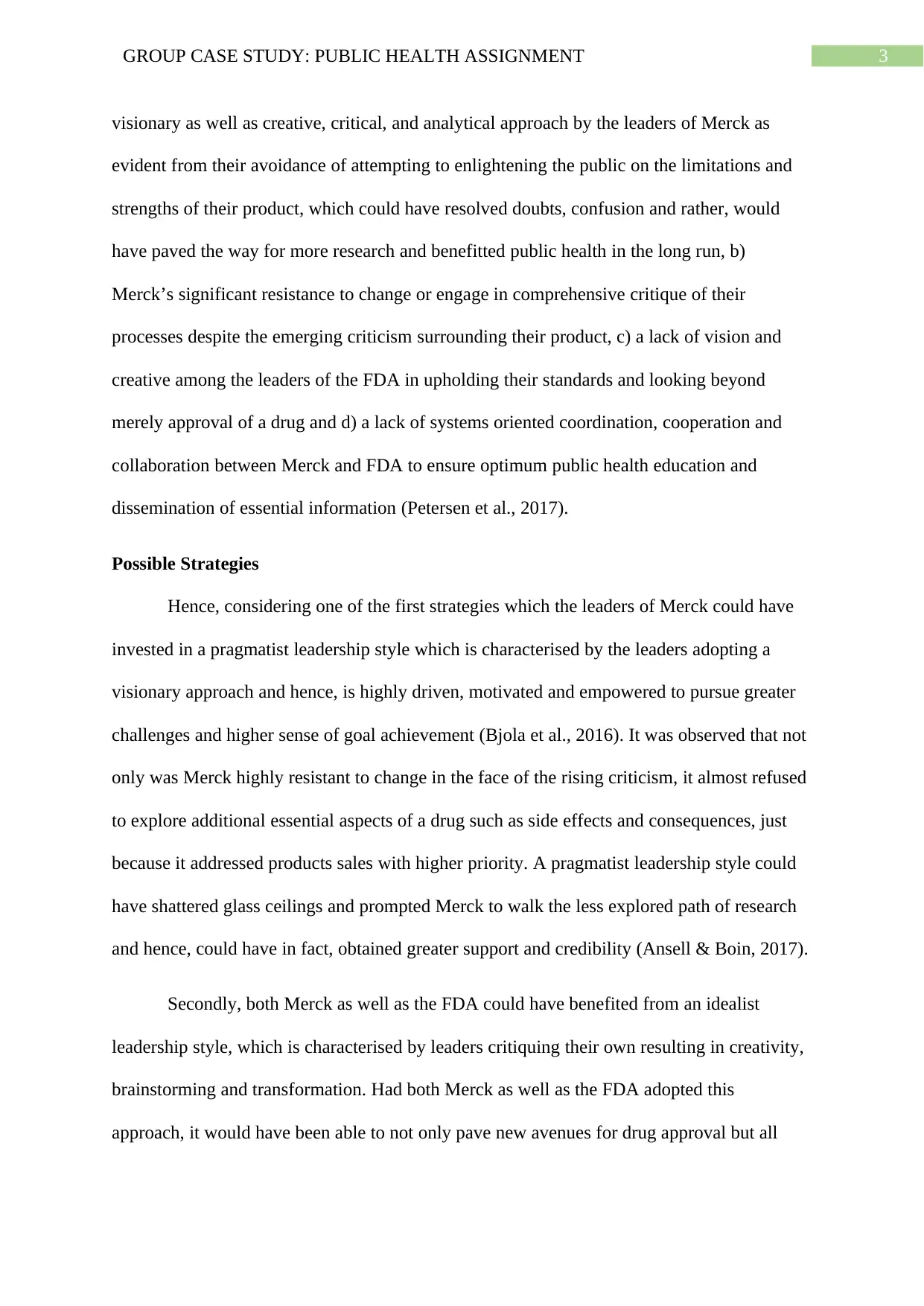
3GROUP CASE STUDY: PUBLIC HEALTH ASSIGNMENT
visionary as well as creative, critical, and analytical approach by the leaders of Merck as
evident from their avoidance of attempting to enlightening the public on the limitations and
strengths of their product, which could have resolved doubts, confusion and rather, would
have paved the way for more research and benefitted public health in the long run, b)
Merck’s significant resistance to change or engage in comprehensive critique of their
processes despite the emerging criticism surrounding their product, c) a lack of vision and
creative among the leaders of the FDA in upholding their standards and looking beyond
merely approval of a drug and d) a lack of systems oriented coordination, cooperation and
collaboration between Merck and FDA to ensure optimum public health education and
dissemination of essential information (Petersen et al., 2017).
Possible Strategies
Hence, considering one of the first strategies which the leaders of Merck could have
invested in a pragmatist leadership style which is characterised by the leaders adopting a
visionary approach and hence, is highly driven, motivated and empowered to pursue greater
challenges and higher sense of goal achievement (Bjola et al., 2016). It was observed that not
only was Merck highly resistant to change in the face of the rising criticism, it almost refused
to explore additional essential aspects of a drug such as side effects and consequences, just
because it addressed products sales with higher priority. A pragmatist leadership style could
have shattered glass ceilings and prompted Merck to walk the less explored path of research
and hence, could have in fact, obtained greater support and credibility (Ansell & Boin, 2017).
Secondly, both Merck as well as the FDA could have benefited from an idealist
leadership style, which is characterised by leaders critiquing their own resulting in creativity,
brainstorming and transformation. Had both Merck as well as the FDA adopted this
approach, it would have been able to not only pave new avenues for drug approval but all
visionary as well as creative, critical, and analytical approach by the leaders of Merck as
evident from their avoidance of attempting to enlightening the public on the limitations and
strengths of their product, which could have resolved doubts, confusion and rather, would
have paved the way for more research and benefitted public health in the long run, b)
Merck’s significant resistance to change or engage in comprehensive critique of their
processes despite the emerging criticism surrounding their product, c) a lack of vision and
creative among the leaders of the FDA in upholding their standards and looking beyond
merely approval of a drug and d) a lack of systems oriented coordination, cooperation and
collaboration between Merck and FDA to ensure optimum public health education and
dissemination of essential information (Petersen et al., 2017).
Possible Strategies
Hence, considering one of the first strategies which the leaders of Merck could have
invested in a pragmatist leadership style which is characterised by the leaders adopting a
visionary approach and hence, is highly driven, motivated and empowered to pursue greater
challenges and higher sense of goal achievement (Bjola et al., 2016). It was observed that not
only was Merck highly resistant to change in the face of the rising criticism, it almost refused
to explore additional essential aspects of a drug such as side effects and consequences, just
because it addressed products sales with higher priority. A pragmatist leadership style could
have shattered glass ceilings and prompted Merck to walk the less explored path of research
and hence, could have in fact, obtained greater support and credibility (Ansell & Boin, 2017).
Secondly, both Merck as well as the FDA could have benefited from an idealist
leadership style, which is characterised by leaders critiquing their own resulting in creativity,
brainstorming and transformation. Had both Merck as well as the FDA adopted this
approach, it would have been able to not only pave new avenues for drug approval but all
Paraphrase This Document
Need a fresh take? Get an instant paraphrase of this document with our AI Paraphraser
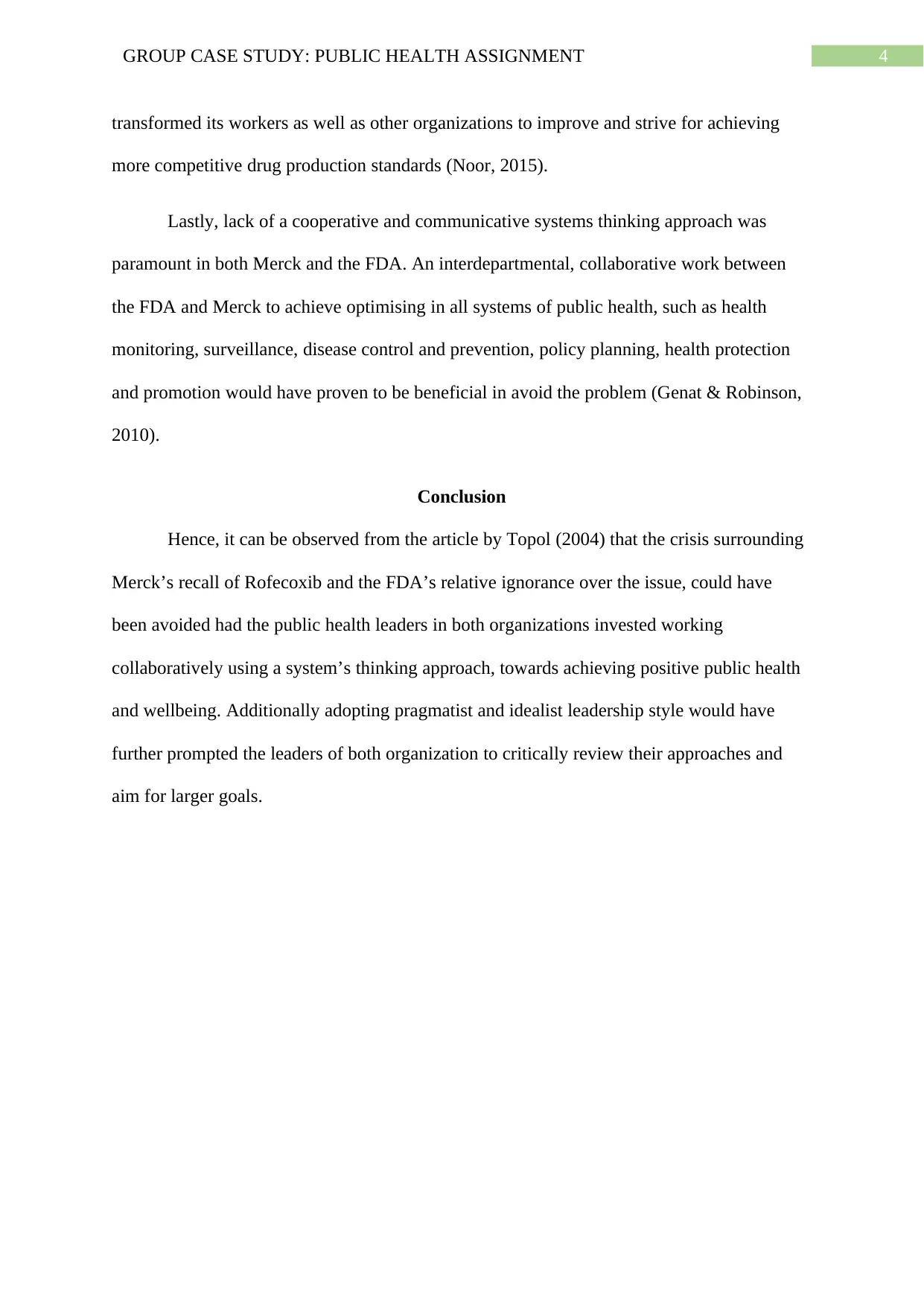
4GROUP CASE STUDY: PUBLIC HEALTH ASSIGNMENT
transformed its workers as well as other organizations to improve and strive for achieving
more competitive drug production standards (Noor, 2015).
Lastly, lack of a cooperative and communicative systems thinking approach was
paramount in both Merck and the FDA. An interdepartmental, collaborative work between
the FDA and Merck to achieve optimising in all systems of public health, such as health
monitoring, surveillance, disease control and prevention, policy planning, health protection
and promotion would have proven to be beneficial in avoid the problem (Genat & Robinson,
2010).
Conclusion
Hence, it can be observed from the article by Topol (2004) that the crisis surrounding
Merck’s recall of Rofecoxib and the FDA’s relative ignorance over the issue, could have
been avoided had the public health leaders in both organizations invested working
collaboratively using a system’s thinking approach, towards achieving positive public health
and wellbeing. Additionally adopting pragmatist and idealist leadership style would have
further prompted the leaders of both organization to critically review their approaches and
aim for larger goals.
transformed its workers as well as other organizations to improve and strive for achieving
more competitive drug production standards (Noor, 2015).
Lastly, lack of a cooperative and communicative systems thinking approach was
paramount in both Merck and the FDA. An interdepartmental, collaborative work between
the FDA and Merck to achieve optimising in all systems of public health, such as health
monitoring, surveillance, disease control and prevention, policy planning, health protection
and promotion would have proven to be beneficial in avoid the problem (Genat & Robinson,
2010).
Conclusion
Hence, it can be observed from the article by Topol (2004) that the crisis surrounding
Merck’s recall of Rofecoxib and the FDA’s relative ignorance over the issue, could have
been avoided had the public health leaders in both organizations invested working
collaboratively using a system’s thinking approach, towards achieving positive public health
and wellbeing. Additionally adopting pragmatist and idealist leadership style would have
further prompted the leaders of both organization to critically review their approaches and
aim for larger goals.
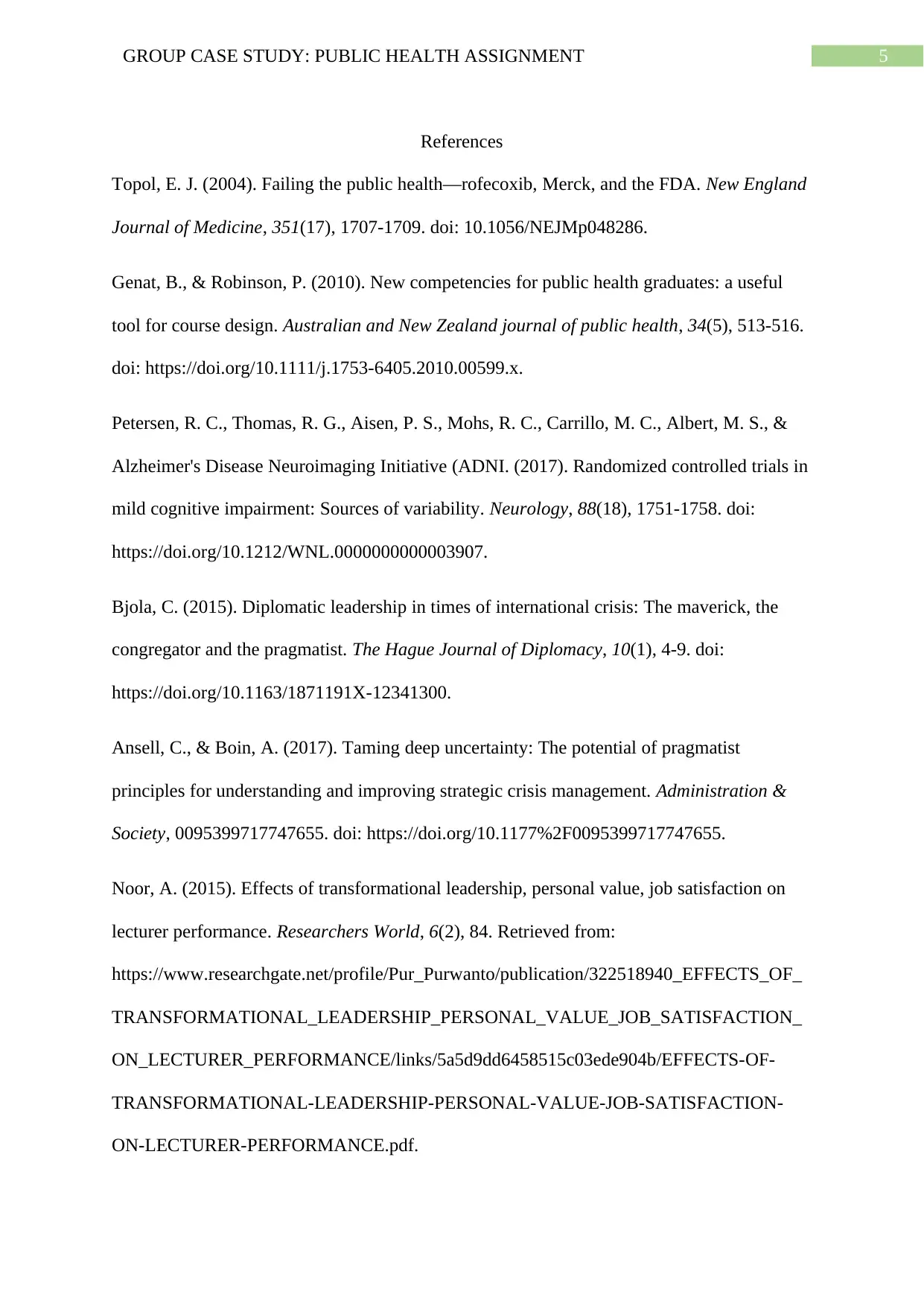
5GROUP CASE STUDY: PUBLIC HEALTH ASSIGNMENT
References
Topol, E. J. (2004). Failing the public health—rofecoxib, Merck, and the FDA. New England
Journal of Medicine, 351(17), 1707-1709. doi: 10.1056/NEJMp048286.
Genat, B., & Robinson, P. (2010). New competencies for public health graduates: a useful
tool for course design. Australian and New Zealand journal of public health, 34(5), 513-516.
doi: https://doi.org/10.1111/j.1753-6405.2010.00599.x.
Petersen, R. C., Thomas, R. G., Aisen, P. S., Mohs, R. C., Carrillo, M. C., Albert, M. S., &
Alzheimer's Disease Neuroimaging Initiative (ADNI. (2017). Randomized controlled trials in
mild cognitive impairment: Sources of variability. Neurology, 88(18), 1751-1758. doi:
https://doi.org/10.1212/WNL.0000000000003907.
Bjola, C. (2015). Diplomatic leadership in times of international crisis: The maverick, the
congregator and the pragmatist. The Hague Journal of Diplomacy, 10(1), 4-9. doi:
https://doi.org/10.1163/1871191X-12341300.
Ansell, C., & Boin, A. (2017). Taming deep uncertainty: The potential of pragmatist
principles for understanding and improving strategic crisis management. Administration &
Society, 0095399717747655. doi: https://doi.org/10.1177%2F0095399717747655.
Noor, A. (2015). Effects of transformational leadership, personal value, job satisfaction on
lecturer performance. Researchers World, 6(2), 84. Retrieved from:
https://www.researchgate.net/profile/Pur_Purwanto/publication/322518940_EFFECTS_OF_
TRANSFORMATIONAL_LEADERSHIP_PERSONAL_VALUE_JOB_SATISFACTION_
ON_LECTURER_PERFORMANCE/links/5a5d9dd6458515c03ede904b/EFFECTS-OF-
TRANSFORMATIONAL-LEADERSHIP-PERSONAL-VALUE-JOB-SATISFACTION-
ON-LECTURER-PERFORMANCE.pdf.
References
Topol, E. J. (2004). Failing the public health—rofecoxib, Merck, and the FDA. New England
Journal of Medicine, 351(17), 1707-1709. doi: 10.1056/NEJMp048286.
Genat, B., & Robinson, P. (2010). New competencies for public health graduates: a useful
tool for course design. Australian and New Zealand journal of public health, 34(5), 513-516.
doi: https://doi.org/10.1111/j.1753-6405.2010.00599.x.
Petersen, R. C., Thomas, R. G., Aisen, P. S., Mohs, R. C., Carrillo, M. C., Albert, M. S., &
Alzheimer's Disease Neuroimaging Initiative (ADNI. (2017). Randomized controlled trials in
mild cognitive impairment: Sources of variability. Neurology, 88(18), 1751-1758. doi:
https://doi.org/10.1212/WNL.0000000000003907.
Bjola, C. (2015). Diplomatic leadership in times of international crisis: The maverick, the
congregator and the pragmatist. The Hague Journal of Diplomacy, 10(1), 4-9. doi:
https://doi.org/10.1163/1871191X-12341300.
Ansell, C., & Boin, A. (2017). Taming deep uncertainty: The potential of pragmatist
principles for understanding and improving strategic crisis management. Administration &
Society, 0095399717747655. doi: https://doi.org/10.1177%2F0095399717747655.
Noor, A. (2015). Effects of transformational leadership, personal value, job satisfaction on
lecturer performance. Researchers World, 6(2), 84. Retrieved from:
https://www.researchgate.net/profile/Pur_Purwanto/publication/322518940_EFFECTS_OF_
TRANSFORMATIONAL_LEADERSHIP_PERSONAL_VALUE_JOB_SATISFACTION_
ON_LECTURER_PERFORMANCE/links/5a5d9dd6458515c03ede904b/EFFECTS-OF-
TRANSFORMATIONAL-LEADERSHIP-PERSONAL-VALUE-JOB-SATISFACTION-
ON-LECTURER-PERFORMANCE.pdf.
⊘ This is a preview!⊘
Do you want full access?
Subscribe today to unlock all pages.

Trusted by 1+ million students worldwide
1 out of 6
Your All-in-One AI-Powered Toolkit for Academic Success.
+13062052269
info@desklib.com
Available 24*7 on WhatsApp / Email
![[object Object]](/_next/static/media/star-bottom.7253800d.svg)
Unlock your academic potential
Copyright © 2020–2026 A2Z Services. All Rights Reserved. Developed and managed by ZUCOL.